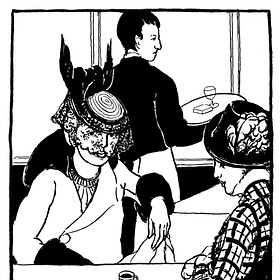—: The Heart of a Woman (1918) :— The heart of a woman goes forth with the dawn, As a lone bird, soft winging, so restlessly on, Afar o'er life's turrets and vales does it roam In the wake of those echoes the heart calls home. The heart of a woman falls back with the night, And enters some alien cage in its plight, And tries to forget it has dreamed of the stars While it breaks, breaks, breaks on the sheltering bars.
—: Contemplation (1918) :— We stand mute! No words can paint such fragile imagery, Those prismic gossamers that roll Beyond the skyline of the soul; We stand mute!
—: Poetry (1918) :— Behold! The living thrilling lines That course the blood like madd'ning wines, And leap with scintillating spray Across the guards of ecstacy. The flame that lights the lurid spell Springs from the soul's artesian well, Its fairy filament of art Entwines the fragments of a heart.
—: Cosmopolite (1922) :— Not wholly this or that, But wrought Of alien bloods am I, A product of the interplay Of traveled hearts. Estranged, yet not estranged, I stand All comprehending; From my estate I view earth's frail dilemma; Scion of fused strength am I, All understanding, Nor this nor that Contains me.
—: Fusion (1922) :— How deftly does the gardener blend This rose and that To bud a new creation, More georgeous and more beautiful Than any parent portion, And so, I trace within my warring blood The tributary sources, They potently commingle And sweep With new born forces!
—: When I Rise Up (1922) :— When I rise above the earth, And look down on the things that fetter me, I beat my wings upon the air, Or tranquil lie, Surge after surge of potent strength Like incense comes to me When I rise up above the earth And look down on the things that fetter me.
—: Autumn (1928) :— Believe me—when I say That love like yours, at this belated hour, Overwhelms me,— Stills the fount of thought! I move as one new-born— And strange to swift transitions As from my prison door I gaze Into a blinding sunlight!
Georgia Douglas Johnson (1880-1996) was a poet and playwright, from Atlanta, Georgia, published by all the major African American arts magazines of the 1910s and 1920s, and was a significant member of the Harlem renaissance literary movement, alongside Langston Hughes, Angela Weld Grimke, Lewis Alexander, Gwendolyn Bennett, Anne Spencer, et al.
Johnson studied at Atlanta University and then the Oberlin Conservatory of Music, married Henry Lincoln Johnson, and moved to Washington with him. While Henry was not particularly supportive of her poetic career, Kelly Dean of Howard University saw some of her work, and passed it on to poet and well-known anthologist William Stanley Braithwaite, who asked to see more. Soon after she sent her work to W.E.B. Du Bois, editor of The Crisis, who immediately published two of her poems.
“At this time Jessie Fauset, the novelist, was teaching French in Washington and very generously helped her to gather together material for her first book The Heart of A Woman (1918) with an introduction by Braithwaite. This was followed by Bronze (1922), a book of color with an introduction by Du Bois. Her third was An Autumn Love Cycle (1928) with an introduction by Alain Locke, the editor of The New Negro.” (Countee Cullen, in Caroling Dusk, 1927)
Johnson worked as a music teacher, played organ at her local church, and would go on to publish 4 books of poetry, 28 plays, and numerous short-stories, as well as being an activist for racial equality, particularly within the anti-lynching movement, and a tireless advocate of African American arts. After her husband’s death she opened her home to writers and artists every Saturday night for over 40 years. Known as the ‘S Street Salon’, it provided a meeting place for the Harlem Renaissance poets, and their peers; “Young writers gathered together almost every Saturday night exchanging ideas, reciting new poems or discussing plans for new creations.” (Cullen, 1927)
Johnson belonged to multiple heritages—her mother was African American and Native American, and her father, African American and English—something which she often addressed in her poetry. The poems ‘Cosmopolite’ and ‘Fusion’, for instance, directly address this, and pair well with other poems addressing the complexity of race in America in the 1910s, like Joseph S. Cotter’s similarly striking ‘To The Mulatto & His Critics’.
“We are made of star stuff” —: After Georgia Douglas Johnson :— By Dick Whyte I. cloud boned & clothed in copper, stitched by sinew thread, teeth made of lead, sky lines our veins with bloody globules of coagulated iron— II. forged in the dying light of sons & daughters crushed beneath the feet of warring giants when we return to the stars will they be proud to call themselves our kin?
Forgotten Poets Presents:
Forgotten Poems, a living anthology of obscure and out-of-print poetry from the late-1800s and early-1900s. Explore the archives:
More African American poetry . . .
Anne Spencer - 5 Short Poems (1920-1975)
—: Dunbar (1920) :— Ah, how poets sing and die! Make one song and heaven takes it: Have one heart and beauty breaks it: Chatterton, Shelly, Keats, and I— Ah, how poets sing and die!...
Edward Perry - 2 Short Poems (1927)
Colors & Life (1927) Colors Blacks, browns, Tans and yellows; Like flowers We're a race Of numerous colors. Life Birth, Love, Sickness, Then death. We toil for tomorrow; Leave our loved ones in sorrow.
Claire Bu Zard - A Question (1917)
—: A Question :— Did you ever lie in a man’s arms and hate him; And mend your children’s clothes And look out across the front lawn And wonder dully what you’d get for lunch? Did you ever walk along the boulevard On a hot afternoon Wheeling a baby,— A pretty golden haired baby That you’d like to paint But couldn’t. And it cried and had to be fed, And…
Anne Spencer - 5 Short Poems (1920-1975)
—: Dunbar (1920) :— Ah, how poets sing and die! Make one song and heaven takes it: Have one heart and beauty breaks it: Chatterton, Shelly, Keats, and I— Ah, how poets sing and die!
J. Crutchfield Thompson [Langston Hughes] - 4 Very Short Poems (1926-27)
—: Pensée :— I would not like to see you Dead Because you are ugly now; In death You would be uglier.
More from the Book of Lost Rhymes . . .
The Dudley Sisters - 5 Short Poems (1914-1923)
The Dudley sisters were “famous in Chicago’s literary circles for their wit, exuberance, and talent.” (Poetry Foundation, 2024) Dorothy and Helen were poets, Caroline also wrote poetry and worked in the theatre, while Katherine was an illustrator and painter. Dorothy and Helen were published in the first issue of Harri…















![J. Crutchfield Thompson [Langston Hughes] - 4 Very Short Poems (1926-27)](https://substackcdn.com/image/fetch/$s_!ME9K!,w_280,h_280,c_fill,f_auto,q_auto:good,fl_progressive:steep,g_auto/https%3A%2F%2Fsubstack-post-media.s3.amazonaws.com%2Fpublic%2Fimages%2Ffbe003b3-13dd-4791-838f-4d6fc1300d83_1000x1184.jpeg)

Oh, wow. “And tries to forget it has dreamed of the stars
While it breaks, breaks, breaks on the sheltering bars.”
And your tribute poem is so beautiful, Dick.
Fascinating context, Dick - thanks (as always) for providing that. In this case, it makes me reflect on the curious contrast of the modern (in her biography) with a degree of rather traditional “poetic” language - the sort of language that (I think) modernists tended to want to do away with. I don’t necessarily know what to make of this contrast - except to note that it’s intriguing. Thanks for a thought-provoking read!